Resilient Shelter Solutions: Lida Group‘s Modular Temporary Labor Camps
In an era of rapid industrialization, global workforce mobility, and the pressing need for sustainable living spaces, the challenge of providing high-quality, adaptable, and environmentally responsible temporary housing has never been more critical. As industries across a wide range of sectors, from construction and manufacturing to energy and infrastructure, grapple with the demands of attracting and retaining skilled, mobile workers, the need for innovative solutions that can meet the evolving needs of the modern workforce has become paramount. Stepping up to this challenge is the Lida Group, a renowned architectural and construction firm that has emerged as a pioneer in the development of modular temporary labor camps – a groundbreaking approach to workforce accommodation that redefines the very concept of temporary living.
The Evolving Needs of the Temporary Workforce
The Lida Group’s journey into the realm of modular temporary labor camps can be traced back to the firm’s recognition of the limitations inherent in traditional temporary housing solutions. As industries across the globe faced the challenges of attracting and retaining skilled, mobile workers, the Lida Group’s team of designers and engineers saw an opportunity to rethink the way these essential employees were being accommodated.
“The conventional approach to temporary worker housing simply didn’t align with the evolving needs and expectations of the modern workforce,” explains the Lida Group’s lead architect. “Whether it was the substandard living conditions, the lack of amenities and services, or the overall disconnection from the broader community, the existing options on the market were failing to meet the basic requirements of these critical employees.”
Driven by this realization, the Lida Group set out to create a new paradigm in temporary workforce accommodation – one that would not only address the practical needs of mobile workers but also elevate the overall quality of life and sense of community within these living environments.
“Our goal was to redefine the very concept of what a temporary labor camp could be,” the lead architect continues. “By embracing the principles of modular design, sustainable construction, and user-centric amenities, we believed we could develop living spaces that would truly enhance the well-being, productivity, and retention of our clients’ workforce.”
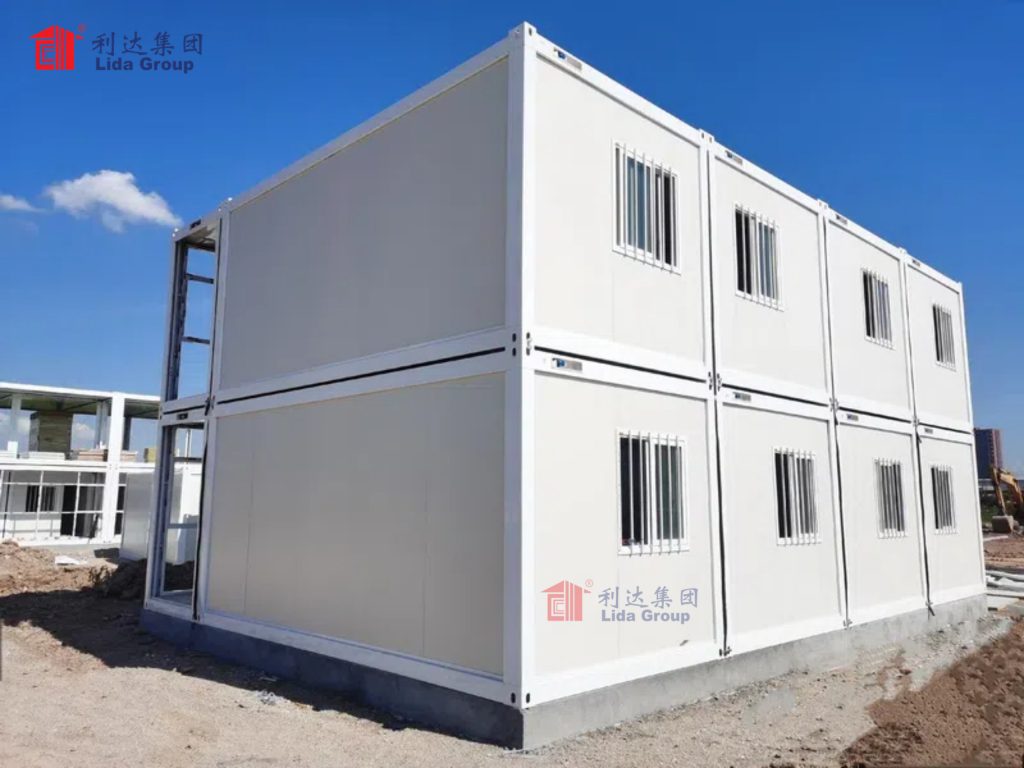
The Lida Group’s Modular Temporary Labor Camp System
At the heart of the firm’s modular temporary labor camp solutions is a highly sophisticated and customizable prefabricated building system that seamlessly integrates the structural integrity and weatherproofing of traditional construction with the adaptability and efficiency of a modular design approach.
“Our modular temporary labor camp system is the culmination of years of research, engineering, and collaboration with experts across a range of disciplines,” explains the lead architect. “From the selection of high-performance building materials to the integration of cutting-edge technologies and amenities, every aspect of this solution has been meticulously crafted to deliver exceptional levels of comfort, functionality, and sustainability.”
The foundation of the Lida Group’s modular temporary labor camp system lies in the use of prefabricated, modular components that can be easily transported, assembled, and reconfigured as needed. These modular units, which can range in size from individual sleeping quarters to larger, multi-room communal facilities, are engineered to be highly durable, weatherproof, and adaptable to a wide range of site conditions and user requirements.
“By embracing prefabrication and modular design, we’re able to create living spaces that can be deployed quickly and efficiently, without compromising on the quality, comfort, or customization that our clients and their workers expect,” the lead architect notes. “Each prefabricated module is carefully constructed in our off-site manufacturing facilities, ensuring a level of precision and attention to detail that simply can’t be achieved through traditional on-site construction methods.”
Complementing the structural foundation of the modular temporary labor camps are a range of cutting-edge technologies and integrated systems that enhance the overall functionality, comfort, and sustainability of the living environments. This includes advanced climate control systems, integrated renewable energy sources, smart home automation features, and innovative water management solutions, all of which work together to create a truly modern and responsive living experience for temporary workers.
“Sustainability and user-centric design are at the core of our modular temporary labor camp system,” the lead architect emphasizes. “By carefully selecting and integrating these high-performance technologies, we’re able to deliver living spaces that not only look and function beautifully but also contribute to a more eco-friendly and resource-conscious future.”
The Lida Group’s modular temporary labor camp system also places a strong emphasis on customization and adaptability, allowing the firm’s design team to tailor each solution to the unique needs and preferences of their clients and their workforce. Through the use of a comprehensive library of pre-engineered modules and specialized design elements, the team can quickly assemble bespoke living spaces that optimize the use of available space, maximize functionality, and align with the client’s specific requirements and budgetary constraints.
“Our clients come to us with a wide range of needs and preferences, from the size and configuration of the living quarters to the integration of specialized amenities and community spaces,” the lead architect explains. “By embracing the flexibility of our modular system, we’re able to create personalized solutions that truly reflect the unique character and requirements of each organization and its temporary workforce.”
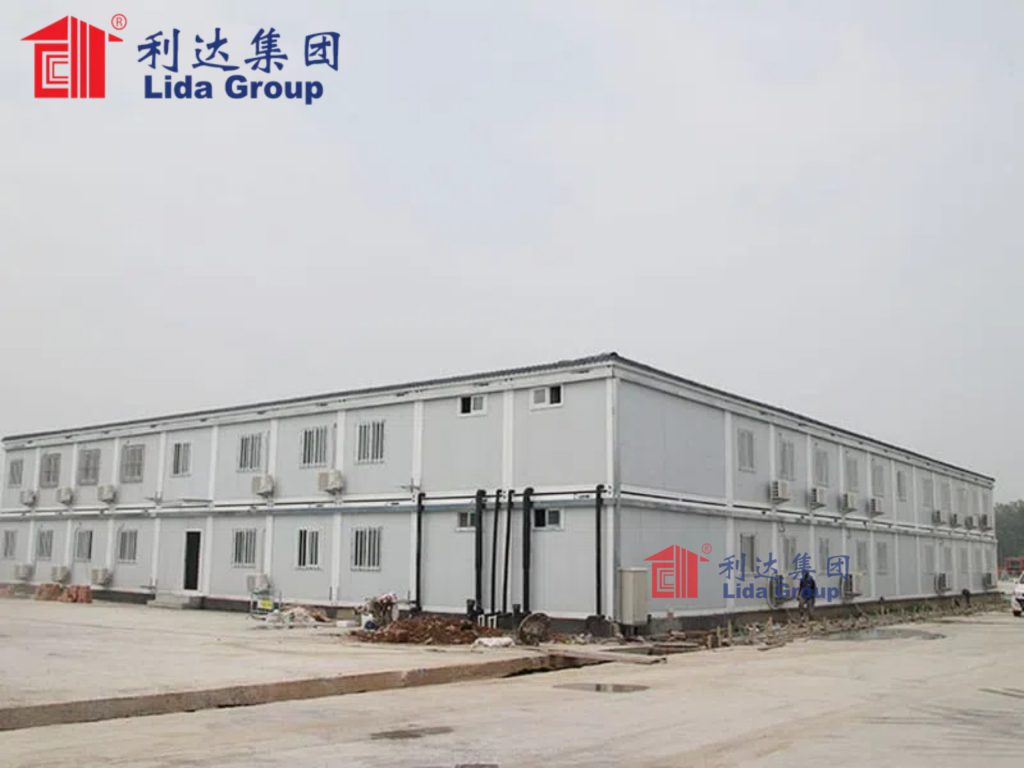
Streamlining the Deployment and Operational Processes
One of the most significant advantages of the Lida Group’s modular temporary labor camp system is its ability to streamline the deployment and operational processes, reducing both the time and cost associated with traditional temporary housing solutions.
“In the conventional temporary labor camp model, the setup, maintenance, and management of these living spaces can be incredibly complex and resource-intensive,” explains the Lida Group’s operations manager. “From the logistics of site preparation and the installation of utilities to the ongoing upkeep and the disruptions caused by on-site construction, the traditional approach is inherently prone to a myriad of challenges that can significantly impact the overall timeline, budget, and operational efficiency.”
By embracing prefabricated construction and the modular design of their temporary labor camp solutions, the Lida Group has been able to address these pain points head-on, leveraging the inherent efficiencies of off-site manufacturing and rapid on-site assembly to deliver high-quality, sustainable living spaces with unprecedented speed and ease.
“With our modular temporary labor camp system, the majority of the construction work is carried out in a controlled, indoor environment, where we can closely monitor and optimize every aspect of the process,” the operations manager elaborates. “This not only eliminates many of the external variables that plague traditional temporary housing solutions but also allows us to achieve a level of quality and consistency that simply can’t be matched on-site.”
The streamlined nature of the Lida Group’s modular temporary labor camp approach also extends to the on-site deployment and operational processes, which are meticulously planned and executed to minimize disruptions and maximize efficiency. Through the use of specialized equipment, pre-engineered connections, and a highly skilled workforce, the firm is able to rapidly assemble the prefabricated components into a complete, fully functional living space, often in a matter of days.
“Our clients are always amazed by the speed and precision with which we’re able to deploy their temporary labor camp solutions,” the operations manager notes. “By eliminating the need for extensive on-site work and the associated logistical challenges, we’re able to significantly reduce the deployment timeline, allowing our clients to occupy their new living spaces and start enjoying the benefits of their investment much sooner.”
This efficiency in deployment and operations not only benefits the Lida Group’s clients but also has a positive impact on the surrounding community. By streamlining the setup process and minimizing on-site disruptions, the firm is able to reduce the overall environmental footprint of their temporary labor camp solutions, contributing to a more sustainable and livable built environment.
“Prefabrication and the modular design of our temporary labor camp solutions aren’t just about saving time and money for our clients,” the operations manager emphasizes. “It’s about rethinking the very nature of temporary housing, in a way that minimizes the negative impacts on the local community and the environment as a whole.”
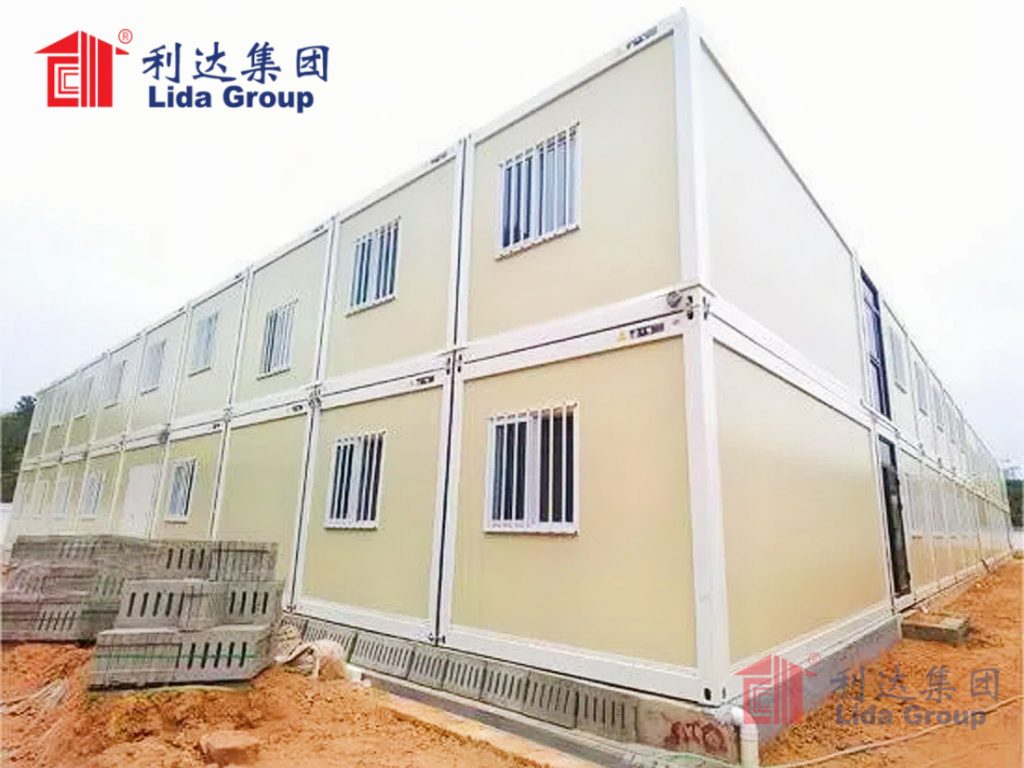
Sustainability and Environmental Responsibility
Sustainability and environmental responsibility have long been cornerstones of the Lida Group’s design and construction philosophies, and their modular temporary labor camp solutions are no exception. By embracing the inherent advantages of off-site manufacturing and the strategic use of high-performance building materials, the firm has been able to develop living spaces that not only deliver exceptional levels of performance and efficiency but also contribute to a more sustainable future.
“Sustainability is not just a buzzword for us; it’s a core tenet of our entire approach to the built environment,” explains the Lida Group’s sustainability expert. “From the materials we use to the energy systems we integrate, every aspect of our modular temporary labor camp solutions is carefully considered to minimize the environmental impact and maximize the long-term sustainability of our projects.”
One of the key ways the Lida Group has achieved this sustainability focus is through the strategic use of high-performance insulation, structural components, and exterior cladding within their modular temporary labor camp system. By leveraging cutting-edge technologies in these areas, the firm has been able to create building envelopes that are remarkably energy-efficient, reducing the overall energy demands and carbon footprint of the living spaces.
“The beauty of our modular temporary labor camp system lies in the way we can precisely engineer and optimize the building envelope to achieve exceptional thermal and energy performance,” the sustainability expert notes. “By carefully selecting and arranging the various layers of the prefabricated components, we’re able to create living environments that are remarkably comfortable, while also minimizing the energy required for heating, cooling, and ventilation.”
In addition to the energy-efficient design of the building envelope, the Lida Group’s modular temporary labor camp solutions also incorporate a range of renewable energy technologies, such as solar panels and wind turbines, further enhancing the overall sustainability of their projects.
“Our clients are increasingly seeking temporary housing solutions that not only look and perform beautifully but also contribute to a more sustainable future,” the sustainability expert explains. “By seamlessly integrating renewable energy sources into our modular temporary labor camp systems, we’re able to create truly self-sufficient living spaces that generate their own clean power and reduce their reliance on traditional, carbon-intensive energy sources.”
The Lida Group’s commitment to sustainability extends beyond the energy performance and renewable energy integration of their modular temporary labor camps. The firm also places a strong emphasis on the responsible sourcing and use of materials, ensuring that their supply chain and manufacturing processes adhere to the highest standards of environmental stewardship.
“We take a holistic approach to sustainability, looking at every aspect of the building lifecycle, from the extraction and production of raw materials to the ultimate decommissioning and repurposing of the structure,” the sustainability expert explains. “By carefully vetting our suppliers, optimizing our manufacturing processes, and designing for disassembly and reuse, we’re able to create modular temporary labor camp solutions that are not only highly efficient and performant but also fundamentally sustainable at their core.”
Through their unwavering dedication to sustainable design and construction practices, the Lida Group has established itself as a leader in the modular temporary housing industry, setting a new benchmark for what can be achieved when efficiency, quality, and environmental responsibility are seamlessly integrated into the built environment.
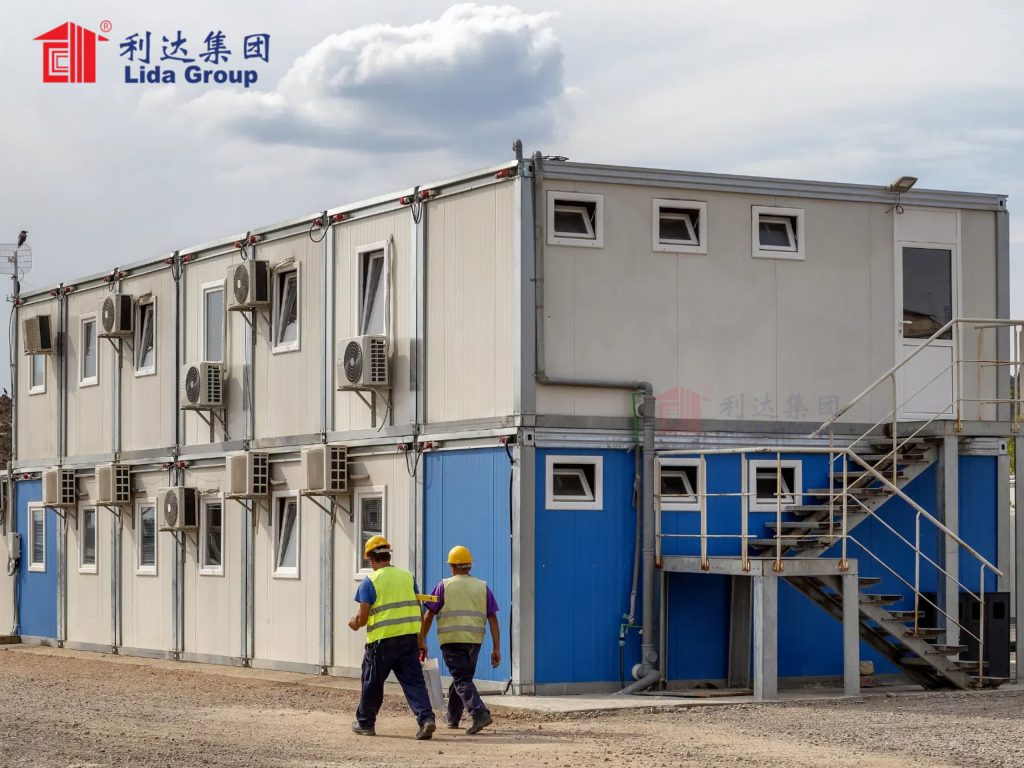
Adaptability and Versatility
One of the key advantages of the Lida Group’s modular temporary labor camp system is its inherent adaptability and versatility, allowing the firm to tailor its solutions to a wide range of user requirements, site conditions, and deployment scenarios.
“Our modular temporary labor camp system is not a one-size-fits-all approach,” explains the Lida Group’s lead designer. “Instead, it’s a highly flexible and customizable platform that enables us to create bespoke living spaces that cater to the unique needs of our clients and their temporary workforce.”
This adaptability is achieved through the modular nature of the Lida Group’s prefabricated components, which can be easily reconfigured, expanded, and integrated to suit the specific demands of each project. By leveraging a comprehensive library of pre-engineered modules and specialized design elements, the firm’s design team is able to quickly assemble tailored solutions that optimize the use of available space, maximize functionality, and align with the client’s aesthetic, lifestyle, and operational requirements.
“Our clients come to us with a wide range of needs and preferences, from the size and configuration of the living quarters to the integration of specialized amenities and community spaces,” the lead designer notes. “By embracing the flexibility of our modular system, we’re able to create personalized solutions that truly reflect the unique character and requirements of each organization and its temporary workforce.”
One particularly impressive example of the Lida Group’s adaptability is their ability to seamlessly integrate cutting-edge smart home technologies into their modular temporary labor camp solutions. Through the strategic placement of IoT-enabled sensors, control systems, and automation features, the firm is able to create highly intelligent and responsive living environments that optimize energy consumption, enhance occupant comfort, and contribute to overall operational efficiency.
“The integration of smart home technologies is no longer a luxury or a nice-to-have; it’s a critical component of any high-performance living space,” the lead designer explains. “By designing our modular temporary labor camp solutions with these cutting-edge systems in mind, we’re able to deliver living spaces that not only look and function beautifully but also leverage the power of data and automation to drive superior levels of sustainability, user experience, and operational excellence.”
This adaptability and versatility have allowed the Lida Group to tackle a diverse range of temporary housing projects, from short-term accommodations for construction workers and seasonal laborers to long-term solutions for displaced individuals and families. Regardless of the scale or complexity of the undertaking, the firm’s modular temporary labor camp system has consistently demonstrated its ability to deliver exceptional results, earning the Lida Group a reputation as a trusted partner in the world of flexible living solutions.
“Our modular temporary labor camp solutions are not limited to any single application or user group,” the lead designer emphasizes. “Whether our clients are looking to build a high-tech, smart-enabled temporary living space, a comfortable and sustainable community for their workforce, or a specialized accommodation facility for a remote project site, our team has the expertise and the tools to create customized solutions that exceed their expectations and push the boundaries of what’s possible in the world of temporary housing.”

Conclusion
The Lida Group’s pioneering work in the realm of modular temporary labor camp solutions has not only redefined the meaning of flexibility and sustainability in the temporary housing industry but has also paved the way for a more adaptable, user-centric, and technologically advanced approach to workforce accommodation.
Through their innovative modular system, the firm has been able to address a myriad of challenges facing the temporary labor housing sector, from the logistical complexities and environmental impacts of traditional temporary camp solutions to the growing demand for flexible, high-performance living spaces. By seamlessly blending the benefits of off-site manufacturing, rapid on-site deployment, and the integration of cutting-edge technologies, the Lida Group has created a solution that not only streamlines the deployment and operational processes but also delivers exceptional quality, performance, and amenities for temporary workers.
As the world continues to grapple with the pressing issues of workforce mobility, resource scarcity, and the evolving needs of modern living and working, the Lida Group’s modular temporary labor camp solutions stand as a shining example of how innovative design and construction practices can be leveraged to create a more sustainable, resilient, and adaptable built environment.
Through their unwavering commitment to sustainability, their focus on user-centric design, and their ability to seamlessly integrate cutting-edge technologies, the Lida Group has firmly established itself as a leader in the modular temporary housing industry, setting a new standard for what can be achieved when efficiency, quality, and environmental responsibility are the driving forces behind the creation of flexible living spaces.
As the industry and the world continue to evolve, the Lida Group’s modular temporary labor camp solutions will undoubtedly play a crucial role in shaping the future of workforce accommodation, providing a blueprint for how we can build smarter, greener, and more responsive living environments that truly enhance the human experience and contribute to a more sustainable future for all.
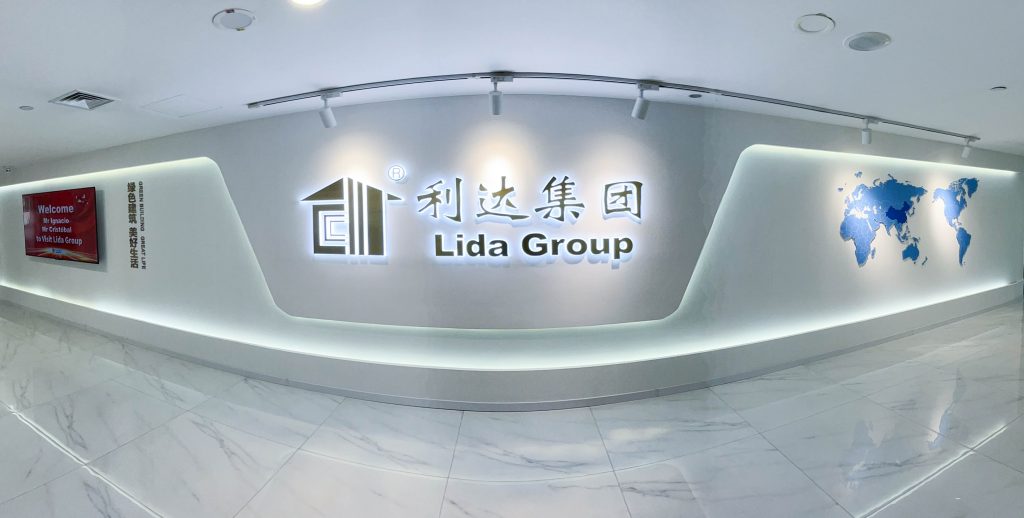
Related news
-
On-the-Go Living: Lida Group's Mobile Temporary Houses for Mobility
2024-12-31 15:38:11
-
Container Prefab Homes by Lida Group: Sustainability and Style Combined
2024-12-31 14:27:14
-
Mobile Temporary Houses: Lida Group's Solution for Flexible Accommodation
2024-12-31 13:41:09
contact us
- Tel: +86-532-88966982
- Whatsapp: +86-13793209022
- E-mail: sales@lidajituan.com


